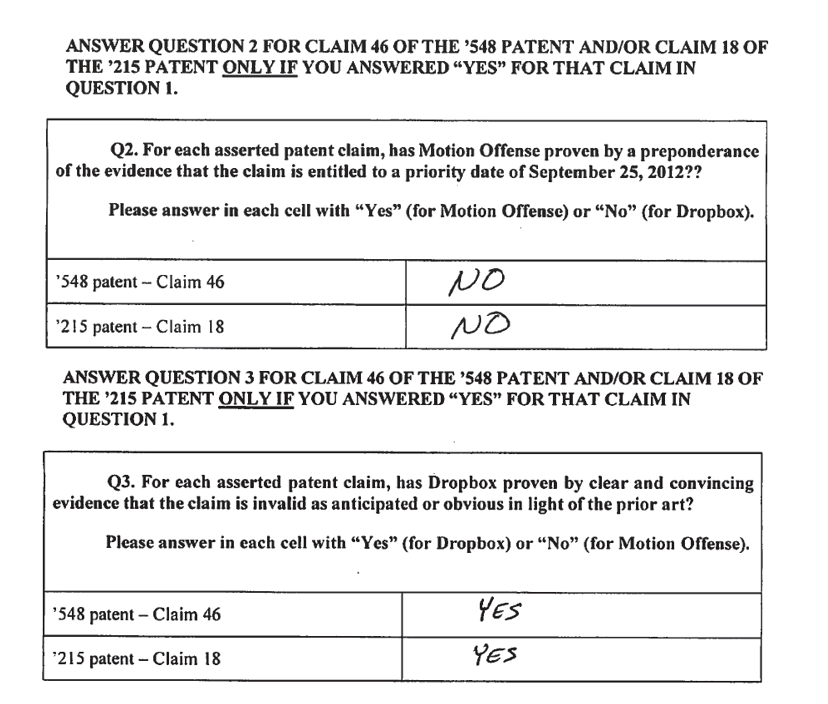Blog
Judge Albright Enters Judgment Despite Jury’s Disregard for Stop Instructions
Blog
October 2, 2024
Background
On May 19, 2023, a Waco jury found that Dropbox did not infringe any of the patent claims asserted by Motion Offense, LLC. Dropbox sought declaratory judgments of non-infringement and invalidity as to some of the patents-in-suit, but not as to two patents (the ’548 and ’215 patents), instead only asserting invalidity as an affirmative defense. Because of this, the court ruled that the validity and priority date of these two patents would only go to the jury if there was a finding of infringement. Question 1 for the jury was whether Motion Offense had proved by a preponderance of the evidence that Dropbox had infringed the claims at issue. The jury did not find infringement of any asserted claim under Question 1:

Next on the verdict form were Questions 2 and 3, which were only to be answered for the claims of the ’548 and ’215 patents if a claim was found infringed in Question 1. However, instead of skipping Questions 2 and 3, the jury filled out each, finding for Dropbox in both instances:

Neither party objected to the judgment before the jury was dismissed.
Approximately three months later during a meet and confer regarding Dropbox’s motion for entry of judgment, Motion Offense raised—seemingly for the first time—the issue of the ignored stop instructions. Judge Albright found that under Federal Circuit precedent, the jury’s verdict was a general verdict with simple “yes” or “no” answers to written questions asking the jury to apply the law to the facts, as opposed to a special verdict wherein the jury is asked to answer specific factual questions focusing exclusively on its fact-finding role.
Judge Albright then found that because Motion Offense did not timely object to the jury’s general verdict (before the jury was dismissed) the arguments raised were waived under Fifth Circuit precedent. The court noted that subject matter jurisdiction was not a bar to entering judgment of invalidity here, especially considering that the jury’s findings of non-infringement and invalidity were simultaneous.
Lastly, Motion Offense’s challenge to the inclusion of the priority date question on the verdict form was rejected by the court. Motion Offense argued that the priority date question had no place in a final judgment because it violated the separate-document rule of Fed. R. Civ. P. 58(a). Judge Albright rejected that argument, finding that the out-of-circuit authority cited by Motion Offense was inapposite because the “mere inclusion of priority date cannot make a final judgment look like a judicial opinion or a memorandum.”
Related Professionals
Related Professionals
This entry has been created for information and planning purposes. It is not intended to be, nor should it be substituted for, legal advice, which turns on specific facts.



